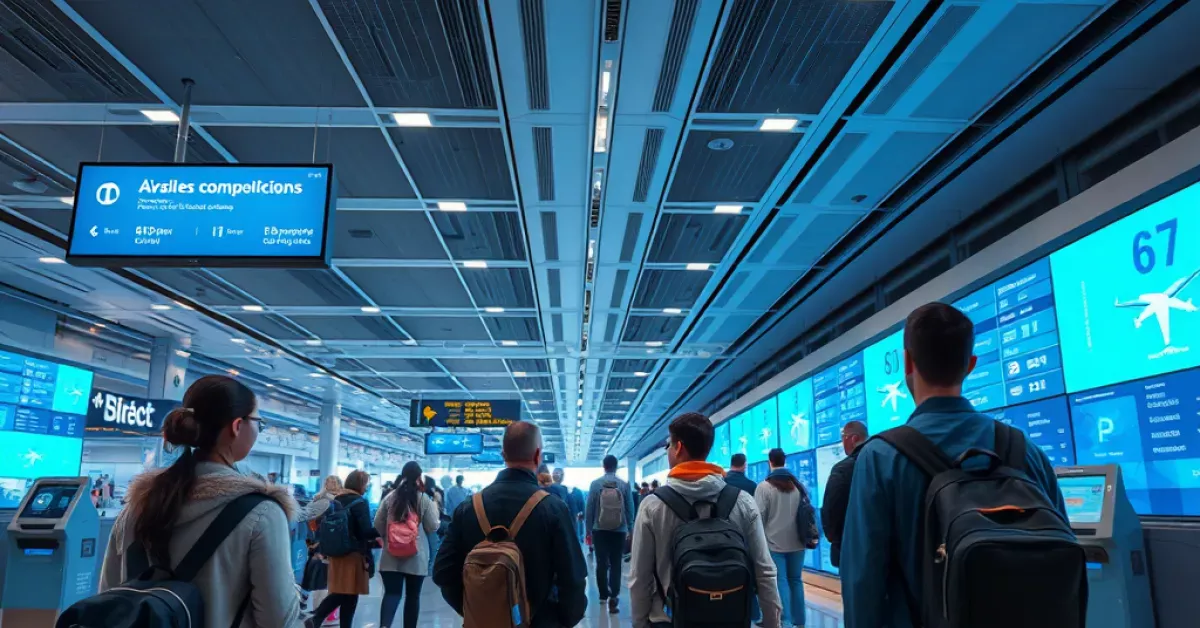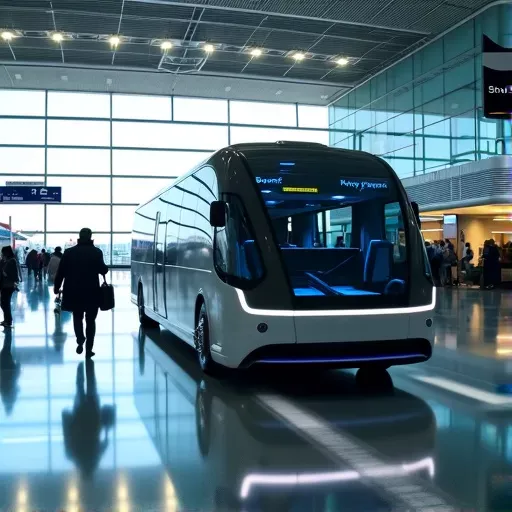In recent years, the airport industry has been rapidly changing, driven by the tremendous advancements in smart technologies. Airports are no longer just terminals where planes land and take off; they are becoming hubs of innovation and efficiency. The shift towards smart airports embraces next-gen innovations, which promise to significantly enhance the travel experience for passengers worldwide.

The Rise of Smart Airports: Embracing Next-Gen Innovations
The Shift Towards Digital Transformation
Airports around the globe are embracing digital transformation as they adopt new technologies to improve efficiency and passenger satisfaction. From check-in to boarding, the focus is on creating a streamlined experience. According to the Airport Council International (ACI), nearly 70% of airports are investing heavily in IT infrastructure to support this transformation. It’s all about making travel simpler, quicker, and safer for everyone.
Key Technologies Shaping the Future of Airports
Several key technologies are playing a crucial role in redefining the way airports operate. Advanced data analytics, biometric identification systems, and automated solutions are at the heart of these changes. Airports are increasingly becoming digital experiences that provide real-time data and support to both passengers and operators.
Enhancing Passenger Experience Through Cutting-Edge Technology
Biometric Scanning for Seamless Travel
Biometric scanning is revolutionising how passengers navigate through airports. Imagine walking through security without having to show a boarding pass or passport. That’s already a reality at places like Heathrow Airport, where biometric systems identify you by your facial features, speeding up the process. This technology not only increases convenience but also heightens security.
Touchless Technology: A Safer Journey
In a world where health concerns are more pronounced, touchless technology has become a cornerstone of modern travel. From check-in kiosks to baggage drops, the fewer surfaces passengers need to touch, the better. Airports that have implemented these technologies report higher passenger satisfaction and safety levels, showcasing their importance in today’s travel ecosystem.
AI in Airports: Revolutionising Operations and Management
Virtual Assistants: Your New Travel Companion
AI-powered virtual assistants are becoming a common sight, helping passengers with everything from gate information to flight status updates. At Changi Airport in Singapore, these assistants offer real-time assistance, creating a personalised travel experience that eases stress and saves time.
Smart Security: Keeping Threats at Bay
Airports are employing AI to enhance security mechanisms. By analysing patterns and identifying threats, AI helps security teams respond more effectively. This not only provides safer travel but also ensures more efficient use of resources.
Automation in Airports: Efficiency Redefined
The use of AI in airport operations, such as baggage handling, is transforming efficiency. For example, Hong Kong International Airport has implemented systems powered by AI to minimise baggage mishandling and enhance delivery times. Such automation ensures reliability and speed, contributing to a better airport experience.
The Role of IoT in Creating Connected Travel Ecosystems

AI virtual assistants are enhancing travel experiences by providing real-time assistance and information at airports, ensuring smoother journeys.
The Role of IoT in Creating Connected Travel Ecosystems
IoT for Travel: Streamlining Airport Processes
The Internet of Things (IoT) is crucial for creating a connected ecosystem in airports. By linking various systems, IoT makes real-time monitoring of luggage, passenger flows, and flight schedules possible. Systems like those at Copenhagen Airport have demonstrated significant improvements in process efficiency and punctuality.
Airport Innovation: Bridging the Digital Divide
Through innovative IoT solutions, airports are not just centres of transportation but are also bridging the digital divide. These solutions enable more efficient energy management and improved passenger services, highlighting their role in sustainable development and connectivity.
Harnessing Autonomous Vehicles for Airport Efficiency
Enhancing Airport Logistics with Automation
Autonomous vehicles are being deployed to optimise airport logistics. These vehicles handle cargo transport, freeing human workers to focus on more complex tasks. The success of such systems can be seen in Seattle-Tacoma International Airport, where autonomous vehicles have improved operational efficiency and reduced delays.
Passenger Transport: The Future is Autonomous
Moving passengers within airports can be a task in itself. The introduction of autonomous shuttles at airports like Schiphol in Amsterdam showcases how these vehicles can ensure timely and efficient transportation, further enhancing the passenger experience.
Smart Airports and the Future of Seamless Journeys

Autonomous vehicles redefine airport logistics and passenger convenience.
Smart Airports and the Future of Seamless Journeys
Personalised Experiences Through Intelligent Systems
Smart airports are providing personalised experiences through intelligent systems that predict and meet passenger needs. By using data analytics, these systems offer tailored services, from travel recommendations to customised shopping promotions.
The Impact of AI on Passenger Services
AI-driven passenger services mean quicker and more accurate information at your fingertips. This technology reduces wait times and anticipates travellers’ needs, setting a new standard for customer service excellence in airports.
Rethinking Airport Layouts: A Smart Approach
As airports continue to evolve, their layouts are being reconsidered to support technology integration. More intuitive designs make it easier for passengers to navigate vast spaces, enhancing overall efficiency and comfort.
Investment Opportunities in Airport Technology
The Growth of Tech Startups in Aviation
The airport tech field is fertile ground for startups. Many new businesses are emerging, developing solutions from AI interfaces to smart security systems. These startups are not only contributing to more efficient airports but are also attracting significant investment, fueling further innovation.
Trends in Airport Infrastructure Funding
There’s a growing trend in funding airport infrastructure improvements. Governments and private enterprises alike are recognising the long-term benefits of investing in technology, ensuring airports remain at the forefront of innovation.
Overcoming Challenges in Digital Transformation
Addressing Privacy Concerns with Biometric Scanning
One major challenge is managing privacy concerns around biometric scanning. Ensuring passengers’ data is secure and used ethically is paramount to gaining public trust. Industry leaders are actively working to implement strict data protection measures.
Ensuring Security in a Hyper-Connected Airport
With increased connectivity comes the need for robust security measures. Airports are moving towards sophisticated cybersecurity systems to protect their data and networks from potential threats. This ensures that the promise of a safe, efficient, and seamless travel experience is kept.
In the rapidly changing landscape of air travel, smart airports stand at the forefront. By harnessing the power of technology, airports worldwide are transforming the passenger experience, ensuring safety, and streamlining operations. As industry innovations continue to unfold, the adoption of these technologies marks the dawn of a new era in travel. Whether through AI, IoT, or autonomous vehicles, the journey toward smarter airports offers a promising glimpse into a seamless and connected future. Stay informed and prepare for a seamless travel experience by understanding the technology driving the future of airports.